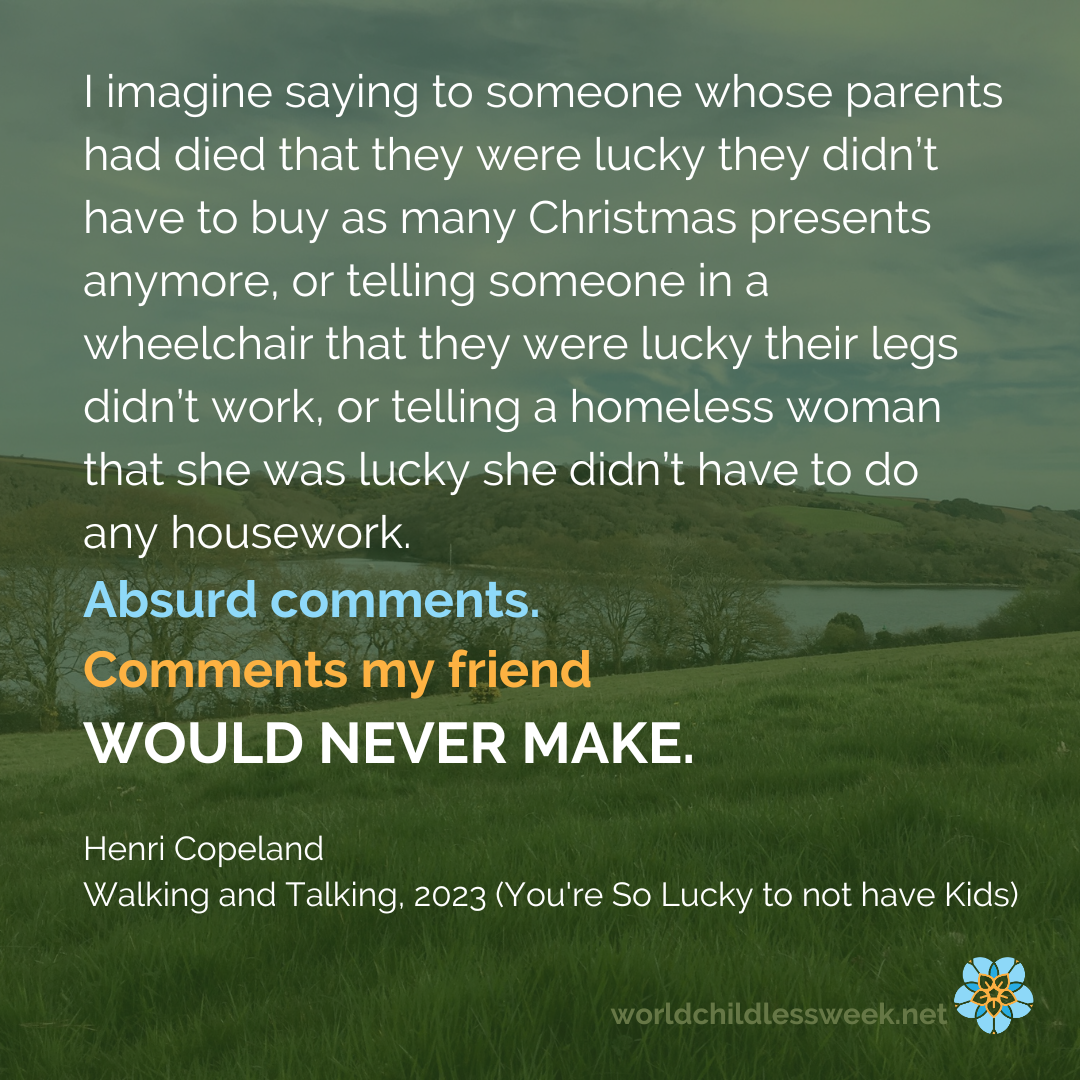Henri Copeland
Behind the line of trees ahead lies the estuary. We can’t see it just yet, but once we’re into the next field, the blue from the sky will bounce off the water below. It’s a walk I haven’t brought my friend on before and I know she’ll be blown away by the views. We climb over the broken stile, avoiding the barbed wire, and make a beeline for the gate that leads into the field.
“So, you said you were writing your book while you were away?” she says, “What’s it about?”
I hesitate, eyes searching for hard ground to step on as we make our way through the boggy gateway.
“So, it’s basically my story of coming to terms with not having children.”
“I’m so sorry,” she edges closer and rubs my arm, “I didn’t know that was something you’ve been struggling with.”
“It’s okay, I’m a couple of years into it, and I’m doing a lot better now.”
Her arm wraps around me and she squeezes me tight, leaning her head into my shoulder. A head hug. I want to press pause and hold onto this empathy before it’s replaced by something else, something that tries to extinguish pain by looking on the bright side. It won’t succeed. All it will do is make me feel that I’m somehow wrong for feeling the way I feel.
“You know, you’re very welcome to borrow my children whenever you like!”
Here we go. This is the moment when she’ll try and imagine her own life had she not had children, how it would give her time for all the things she craves – mostly peace and freedom.
“You’re actually lucky you don’t have kids.”
I smirk. Her words are absurd to me. I imagine saying to someone whose parents had died that they were lucky they didn’t have to buy as many Christmas presents anymore, or telling someone in a wheelchair that they were lucky their legs didn’t work, or telling a homeless woman that she was lucky she didn’t have to do any housework. Absurd comments. Comments my friend would never make.
“Seriously,” she continues,“Every morning I strop around thinking how much I hate mine! It’s not everything it’s cracked up to be, having kids.”
The easiest thing would be for me to point out that if her children died, she wouldn’t feel lucky at all. She wouldn’t feel lucky that her four year old didn’t wake her up at 4.43am to ask her if it was time to get up yet. She wouldn’t feel lucky that she didn’t have to do the school run or drive to yet another after-school club when she just wanted to curl up on the sofa and watch tv. She wouldn’t feel lucky that instead of dealing with a tantrum, she could sweep the kitchen floor and trust that it would still look relatively clean half an hour later.
It’s not the done thing though, to ask someone to imagine their children dying or to suggest that the grief of not having children can in any way compare to the grief of losing a child. I hunt for another way to explain.
“I know it’s tough, being a parent. I really do. I’ve spent enough time looking after children to know how relentless it is, but knowing all that doesn’t stop the grief.”
I can practically hear her frown, unable to comprehend what I’m saying. Like nearly every other friend I’ve spoken to, she believes that you can’t miss something you’ve never had. She’ll circle back to this belief in a few moments, when I explain that part of my reason for not ‘doing it alone’is that I never wanted my child to miss knowing their father.
“The thing is,” I say, trying to contain the wobble in my voice,“I love my children as fiercely as you love yours, in spite of your morning strop.”
The conversation moves forward at the same pace as our footsteps across the fields. Quick strides that race through questions and answers. IVF. Adoption. Sperm Donors. Egg Freezing. All things that I’ve spoken about countless times before with other friends. We reach the final gate and as we climb over it and join the woodland path, I realise she has missed the estuary views. Winding through the woods back towards my house gives her time to check that my sadness isn’t just hormonal, because we’re of a certain age now. Perimenopausal, probably.
When our walk comes to an end, she gets into her car to go and collect her children. I step back into the quiet of my home and put the kettle on. While it boils, I wonder if my friend came any closer to understanding or accepting my grief. I wonder whether she has taken on board that I know my life would not be made of greener grass for having children, but that that knowledge doesn’t lessen the grief. And I wonder what she will be thinking later when her two children get into her car, demanding to know what’s for tea before they’ve even done their seatbelts up. Will she think she is unlucky to have them?

